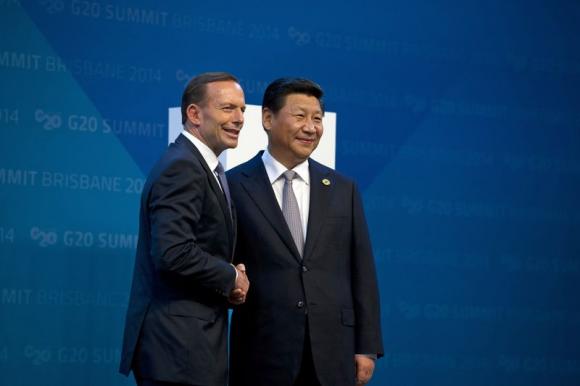
China's President Xi Jinping (R) is welcomed by Australia's Prime Minister Tony Abbott as he arrives for the G20 Summit in Brisbane November 15, 2014.
CREDIT: REUTERS/ALAIN JOCARD/POOL
(Reuters) - China and Australia will sign a free trade deal on Monday that will open up markets worth billions of dollars to Australian farm exporters and the services sector while loosening restrictions on Chinese investment in the resource-rich nation.
The deal, which Chinese President Xi Jinping is due to sign in Canberra during a state visit to Australia, comes after a decade of negotiations.
"Up to 95 percent of our exports over time will enter the Chinese market tariff free," parliamentary secretary Josh Frydenberg said in a television interview on Sunday.
"When you consider China is Australia's major trading partner, A$150 billion ($130 billion) worth of two-way trade, this is great news for the Australian cultural sector, the services sector."
Australia is attempting to transition from a reliance on exports of minerals such as coal and iron ore to expanding its food and agricultural exports to a growing Asian middle class, moving from a "mining boom" to a "dining boom".
Paul Glasson, the National vice President of the Australia China Business Council, hailed the much-improved access for up to 40 service industries including health, law and aged care, as well as for agricultural products such as dairy, rice, wheat, wool, and cotton.
The agreement will give Australian dairy farmers tariff-free access within four years to China's lucrative infant formula market, minus any of the "safeguard" caps that currently restrict competitors from New Zealand, the Sydney Morning Herald reported, citing sources.
Winemakers, currently selling more than A$200 million worth of goods to China each year despite tariffs of between 14 and 30 per cent, will also see tariffs eliminated over four years, it reported.
Tariffs on horticultural products, seafood and other goods accounting for 93 per cent of Australian exports by value will also be reduced to zero by 2019, according to the newspaper. Tariffs recently imposed on Australian coal will be removed over two years.
The Minerals Council of Australia said it understood that that the agreement would eliminate a 3 per cent coking coal tariff immediately and a 6 per cent tariff on thermal coal within two years.
Xi is in Canberra on Monday after attending the G20 leaders' summit at the weekend in Brisbane. His visit is also scheduled to include stops in Sydney and Tasmanian state capital Hobart.